-
 Published: Nov 17, 2025
Published: Nov 17, 2025
-
 11 min. read
11 min. read
-
Summarize in ChatGPT
-
 Thaakirah Abrahams
Thaakirah Abrahams WebFX Editor
WebFX Editor
- Thaakirah Abrahams is a Marketing Editor at WebFX, where she leverages her years of experience to craft compelling website content. With a background in Journalism and Media studies and certifications in inbound marketing, she holds a keen eye for detail and a talent for breaking down complex topics for numerous sectors, including the legal and finance industries. When she’s not writing or optimizing content, Thaakirah enjoys the simple pleasures of reading in her garden and spending quality time with her family during game nights.
-
What’s driving the AI-driven brand reputation crisis?
AI search engines like ChatGPT and Gemini often build their understanding of brands from Reddit threads, online forums, and outdated content rather than official corporate websites, leading to the spread of inaccurate or biased information about companies. -
How does AI misinformation differ from AI hallucinations?
AI misinformation involves false information caused by errors, outdated facts, biases, or leading prompts from real sources, while AI hallucinations occur when LLMs create factually inaccurate answers when they lack knowledge but still attempt to respond. -
How can businesses audit their brand’s AI misinformation exposure?
Companies should create a review process using tools like OmniSEO® to prompt AI search engines with brand-related queries, monitor responses for inaccuracies and biases, identify commonly cited sources, and look for patterns in how LLMs interpret their brand. -
Why should companies engage with online forums like Reddit?
Since AI platforms frequently cite Reddit and similar forums, businesses can build credibility by creating appropriate profiles, joining relevant discussions, answering industry questions, responding to reviews, and providing valuable insights without overt self-promotion. -
What content strategies help prevent AI misinformation?
Businesses should update high-impact website content to fix inconsistencies, write thought leadership articles and ‘best of’ content that positions their products favorably, use clear formatting with FAQs and bullet points, and encourage detailed positive customer reviews. -
How to ensure AI shows accurate information about your brand?
Protecting your brand in AI search starts with managing the signals AI relies on. Ensure your website has a clear, consistent source of truth across your About page, service pages, FAQs, pricing, and policies. Remove outdated or conflicting information that could cause AI to repeat incorrect details. Strengthen off-site signals by addressing misinformation in forums, reviews, and third-party content, and encourage detailed, accurate customer feedback. Finally, regularly test brand-related prompts across AI tools to monitor recurring claims and confirm that accuracy improves over time.
AI tools like ChatGPT, Gemini, and Perplexity can repeat outdated, biased, or incorrect information about your company — often pulled from forums, reviews, or older webpages.
If you’re wondering:
- How can I ensure AI shows accurate information about my brand?
- How do I protect my brand reputation in AI searches?
The answer comes down to three core actions:
- Audit what AI tools are saying about your brand
- Correct misinformation at the source
- Strengthen authoritative content that AI can confidently reference
This guide walks you through exactly how to protect your brand reputation in AI search — and ensure AI tools reflect accurate, up-to-date information about your business.
What’s driving the brand reputation crisis?
AI misinformation is a major driver of recent brand reputation issues. AI search engines or LLMs like ChatGPT and Gemini build their understanding of your brand on the information they find online. Sometimes that information comes from Reddit threads, online forum discussions, and inaccurate or outdated content from reputable sites.
A recent AI search study found that Reddit outranks corporate sites across all industries in AI search engine results. Here’s a quick look at the sources ChatGPT cites most:
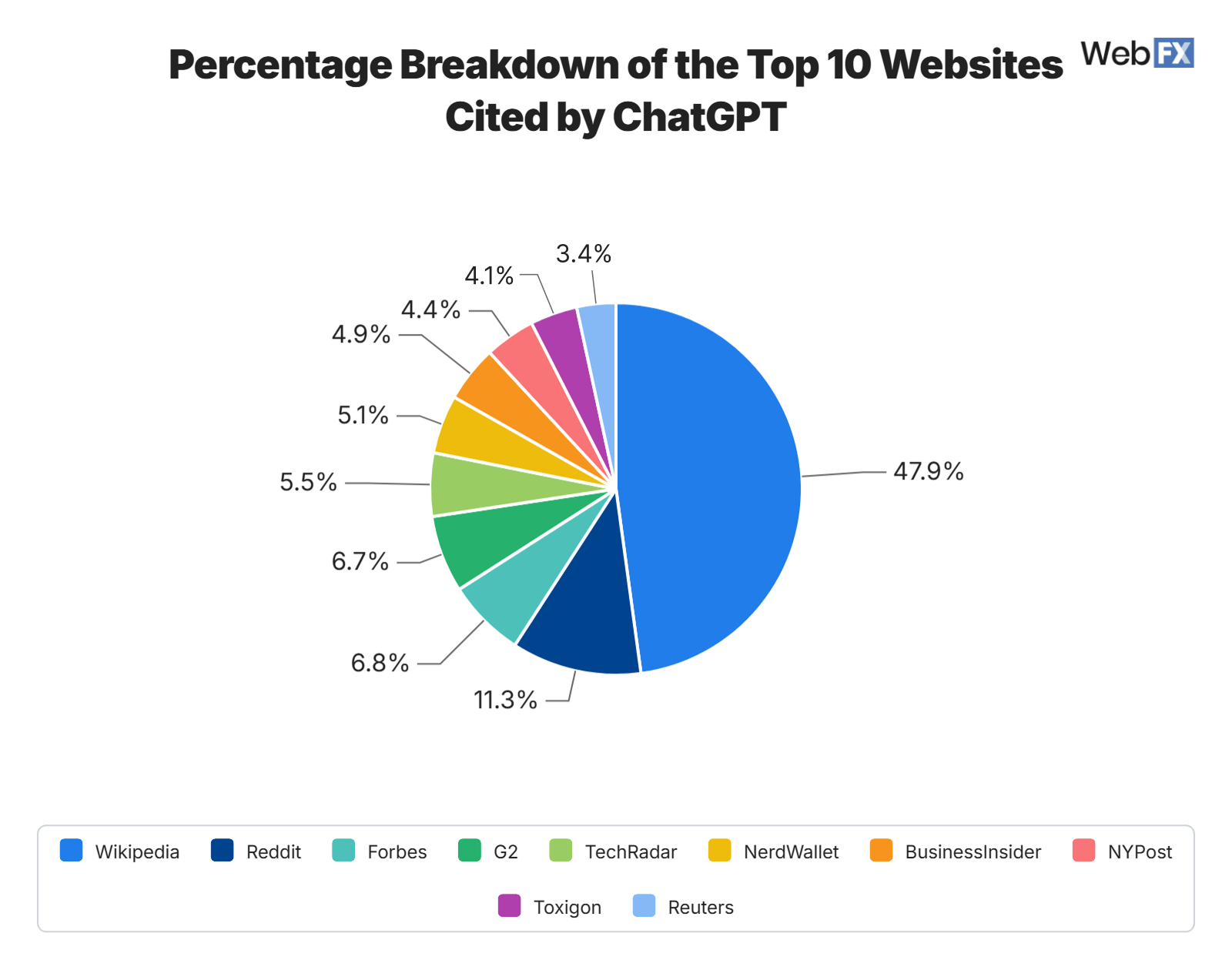
And here’s the percentage share of websites that Perplexity cites most:
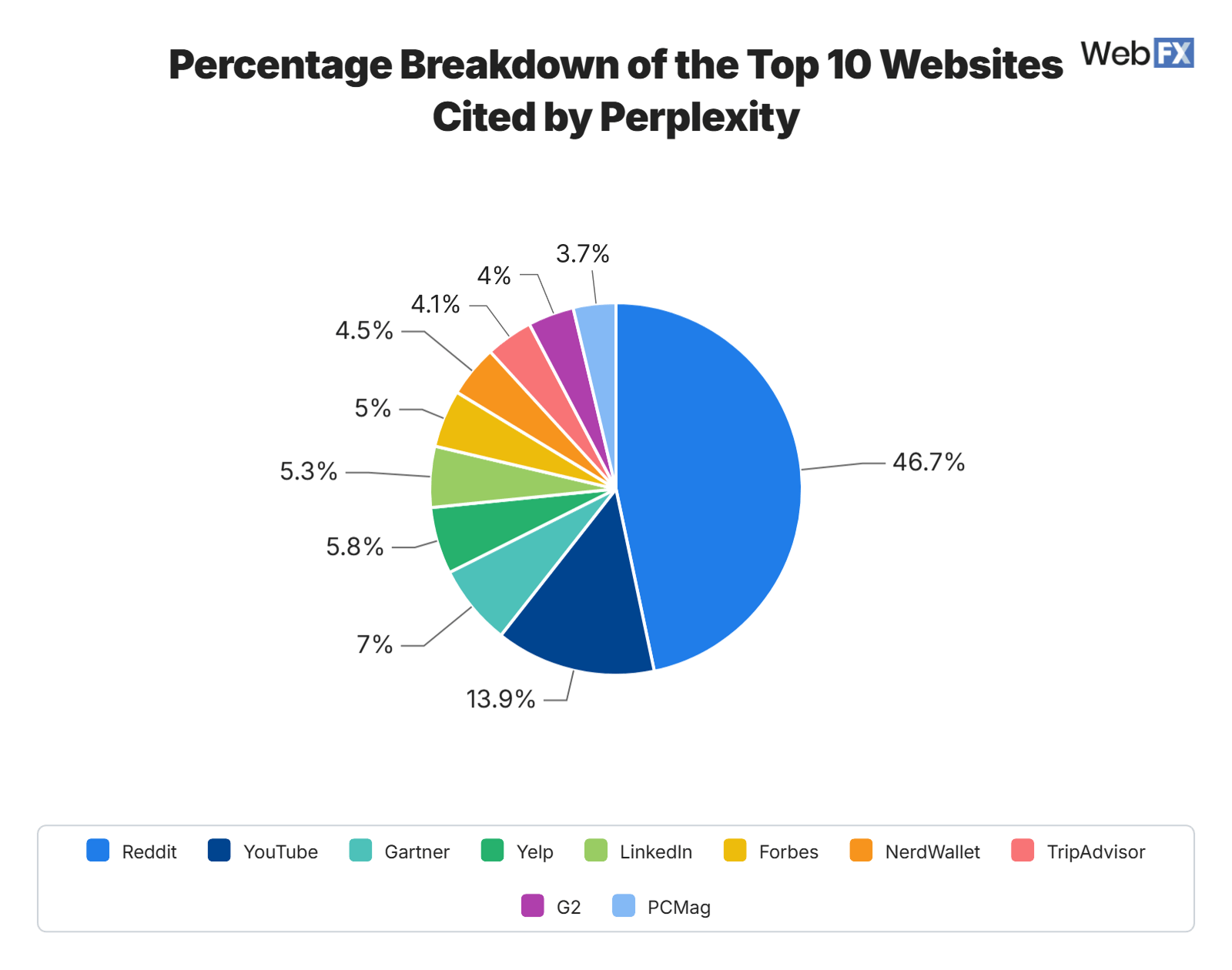
You’ll even find that Google trusts Reddit a great deal and trains its AI models on posts from the online discussion forum. Now, many of their searches include Reddit threads in the search engine results pages (SERPs).
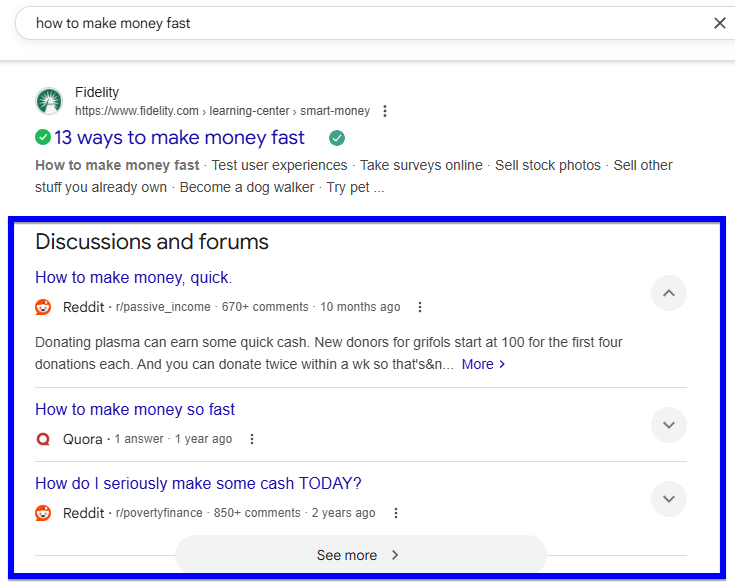
AI misinformation vs. AI hallucinations in LLMs
Before you can protect yourself from the AI-driven brand reputation crisis, you need to understand what AI issue you’re protecting yourself from.
A more widely known LLM issue is AI hallucinations. AI hallucinations are factually inaccurate answers that the LLM creates when it lacks knowledge but still tries to answer.
AI misinformation is a more accurate term for the issue you’re probably facing. AI-generated misinformation is false information caused by errors. It’s often influenced by outdated facts, biases, or leading prompts.
Here is a table that will help you establish the issue you’re facing.
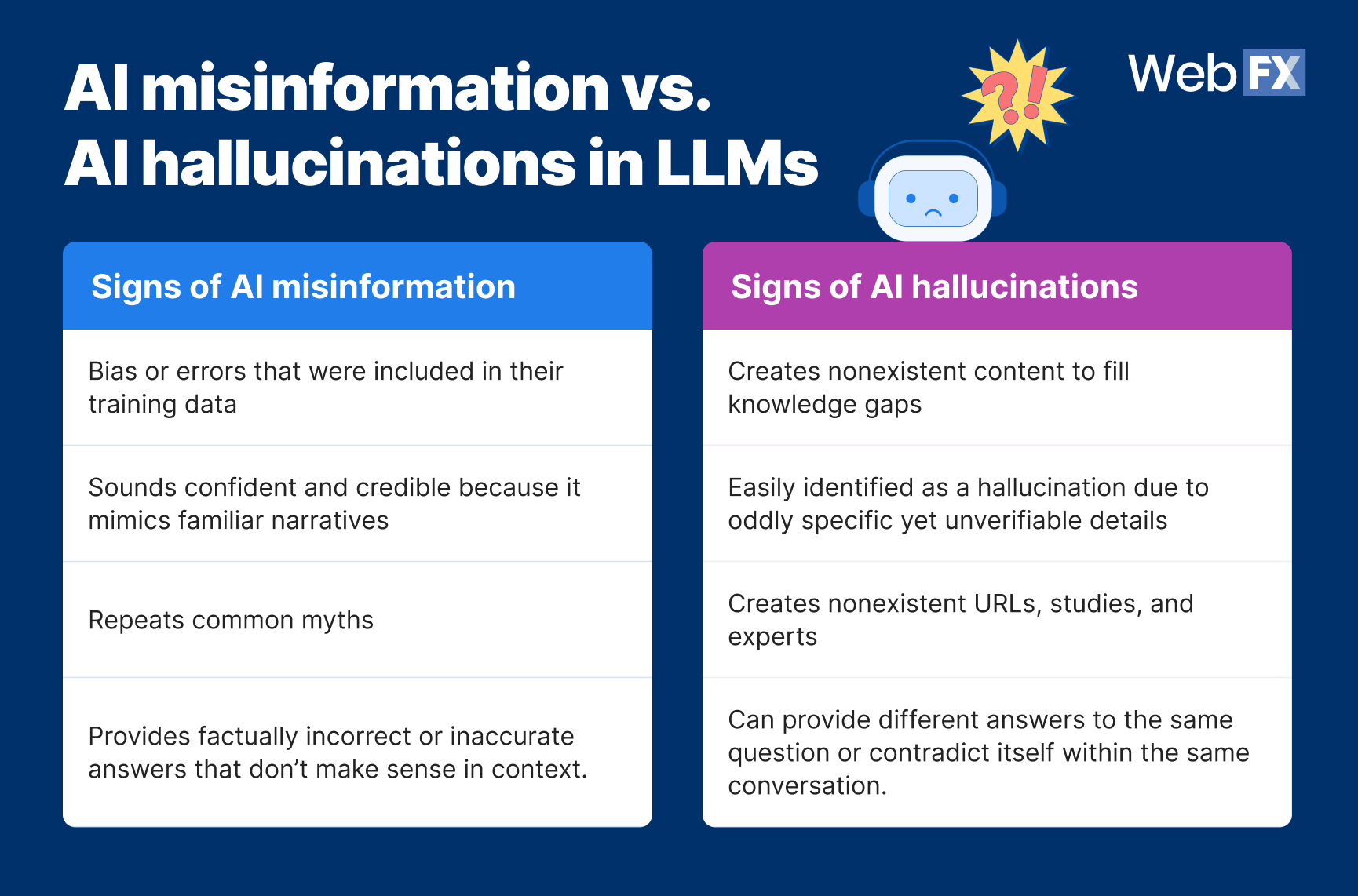
Table view
| Signs of AI misinformation | Signs of AI hallucinations |
| Bias or errors that were included in their training data | Creates nonexistent content to fill knowledge gaps |
| Sounds confident and credible because it mimics familiar narratives | Easily identified as a hallucination due to oddly specific yet unverifiable details |
| Repeats common myths | Creates nonexistent URLs, studies, and experts |
| Provides factually incorrect or inaccurate answers that don’t make sense in context | Can provide different answers to the same question or contradict itself within the same conversation |
If AI platforms are spreading biases or outdated facts about your brand, it’s probably AI brand misinformation.
If AI answers are way off about your brand information and details, it’s likely that it’s a hallucination. Hallucinations mean that the LLM doesn’t know enough about your brand. In that case, you’ll need to enhance your AI visibility.
You can control how AI search perceives your brand
Well, some of it. Here’s a closer look at the narratives you can control and the ones you can’t.
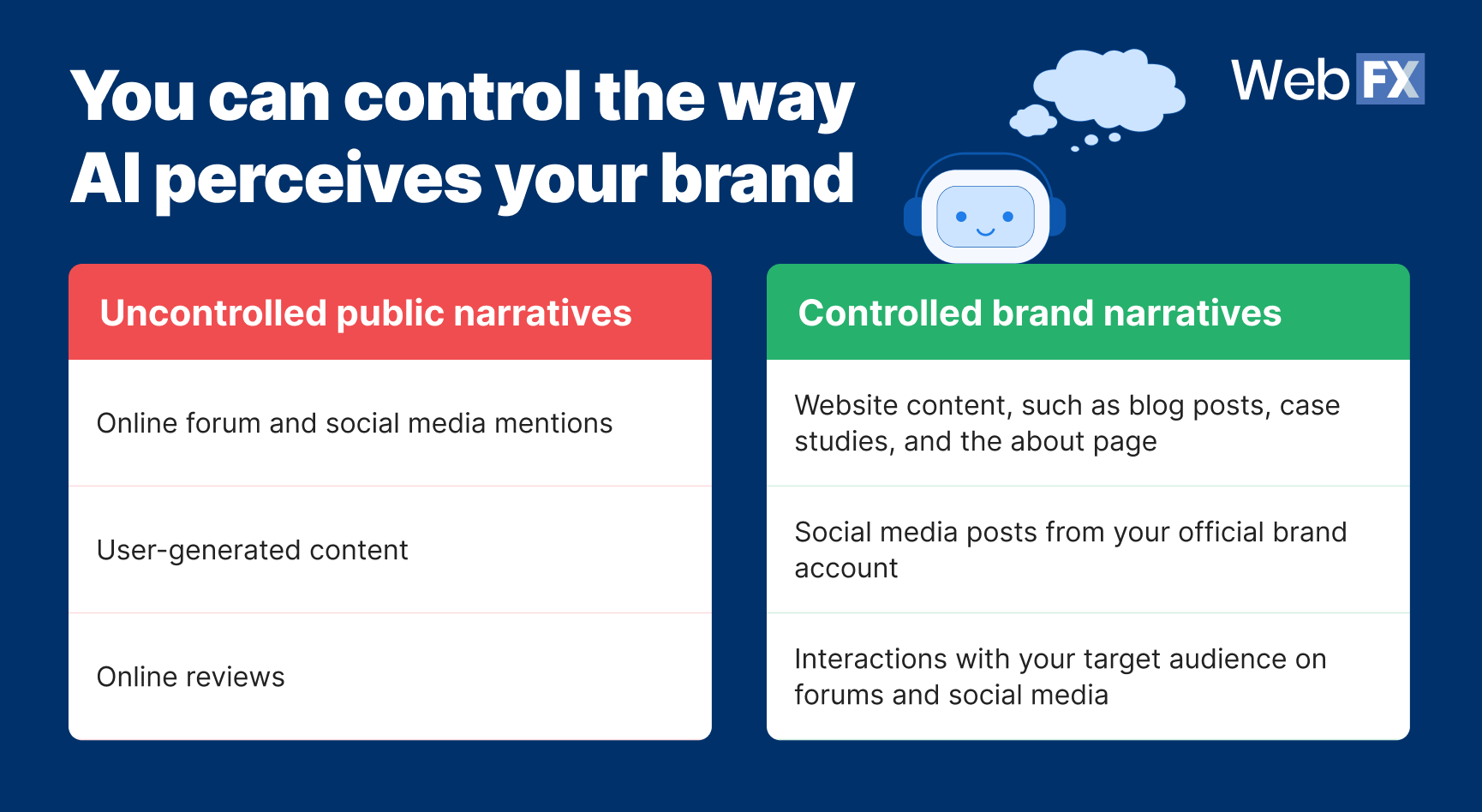
Table view
| Uncontrolled public narratives | Controlled brand narratives |
| Online forum and social media mentions | Website content, such as blog posts, case studies, and the about page |
| User-generated content | Social media posts from your official brand account |
| Online reviews | Interactions with your target audience on forums and social media |
Sure, it’s true that companies cannot always control these public narratives. But what if I told you there was a way to control these public narratives and reduce the damage AI does to your brand reputation?
Before we get into those details, let’s first uncover your brand’s exposure to AI misinformation.
How to audit your brand’s misinformation exposure
Want to know what LLMs are saying about your brand? You can evaluate and start to manage brand perception by following these steps.
1. Create an automated or manual review process
Establish whether you plan to use an automated tool to review what LLMs say about your brand or manually feed LLMs prompts about your brand. Tools like OmniSEO® can help you identify which AI search engines talk about your brand the most.
Start by prompting those AI search engines with queries related to your brand, products, or services. Make sure your prompts include real-world examples of misinformation about your brand and biased narratives.
2. Monitor responses for AI misinformation
Analyze LLM answers for biased opinions, inaccuracies, unverified claims, and harmful content about your brand.
OmniSEO® will help you identify which sources the engine cited most to generate those answers. This will tell you where most of these biases come from, whether online forums, reviews, or media.
3. Establish the LLM’s interpretation of your brand
Now, you can start looking for patterns in LLM answers. Ask yourself:
- Are there specific types of topics or prompts that consistently trigger negative or misleading responses?
- Is the LLM showing bias or prejudices when discussing topics related to your brand?
- How does the LLM rate the credibility of sources discussing your brand?
- Is the LLM generating harmful URLs or dangerous information in relation to your brand?
- Are there any noticeable knowledge gaps in which the LLM lacks knowledge or has inaccurate information about your brand?
The patterns you find here will be crucial to informing a refined AI reputation strategy.
Prevent AI misinformation and win back your reputation with these 7 steps
Now that you know what AI thinks about your brand, you can take the necessary steps to reduce the damage to your brand reputation based on your particular audit findings. Here’s how to protect your brand reputation in the age of AI.
Use these seven actions to protect your brand reputation in AI search and prevent misinformation from shaping how AI tools describe your business.
1. Flag AI misinformation
This is a simple one, but still very worth mentioning. As soon as you catch an inaccurate answer from LLMs, flag it and correct it with more accurate information. This will help you train them to avoid providing similar misinformation related to your brand.
2. Update high-impact content
If the LLM you tested had knowledge gaps or provided inaccurate information, it’s possible that your website’s old and new content might contradict each other, creating inconsistencies across your site.
Take time to fix and clarify inconsistencies in your brand story by updating your about page, service pages, and homepage.
Otherwise, when creating new content, structure your articles with step-by-step guides, FAQ sections, bullet points, and tables. Doing so will enhance your content’s clarity and AI readability.
If LLMs are citing more online forums than your official website, write more thought leadership content that addresses topics that your competitors are missing. Doing this and adding credentials to author bios will help you reinforce your brand’s authority, causing LLMs to cite your content more.
3. Write more “best of” content
When people use AI search engines like ChatGPT to find the best company suited to their specific issue and needs, AI likes to cite “best of” blog posts for their answer. This offers a great opportunity for you to solidify brand product associations.
For example, if your company offers a special needs homeschool curriculum, you could write an article titled “10 best homeschool curricula for special needs” and list your curriculum as the first.
This specifies who your curriculum is for and positions your brand as the best in the industry. If your article ranks well, there’s a higher chance that ChatGPT will recommend your product to parents with children who have special needs.
Here’s an example of a homeschool curriculum provider that positions their product as number one.
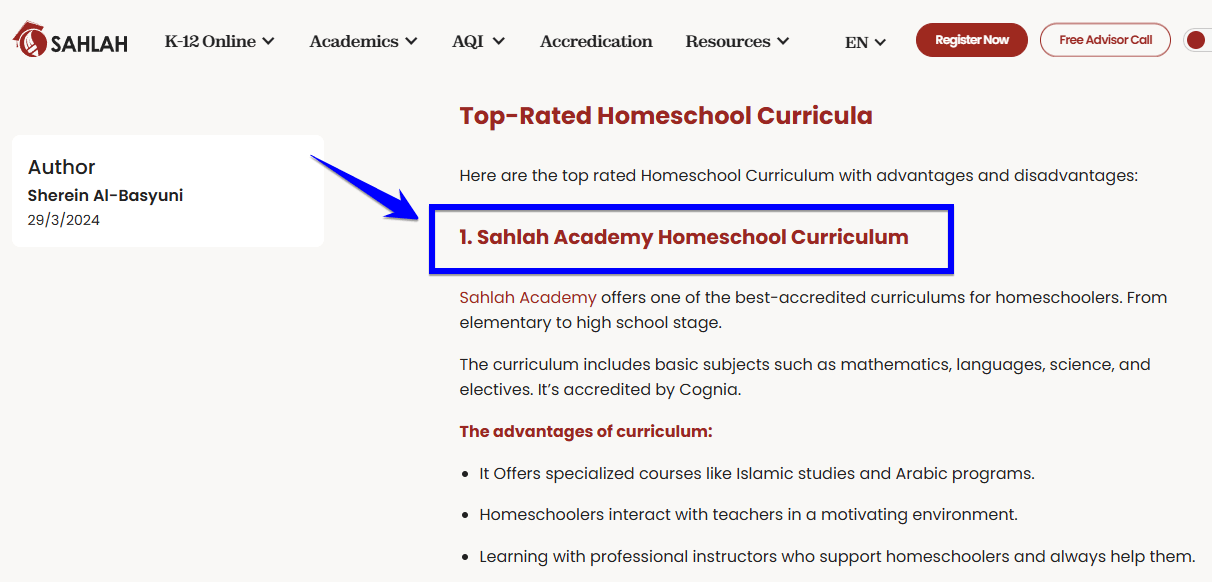
4. Respond to communities in commonly cited websites
Is AI consistently citing Reddit, Quora, review sites, and other online forums? This is your opportunity to build a profile on the platform if you haven’t already and start engaging with the community.
When Reddit users start threads to ask questions about your brand, respond to them yourself and offer valuable and authentic answers.
Here are a few steps you can follow to do this right, especially if it’s on Reddit:
Create a forum-appropriate profile
On Reddit, you want to create a plain profile that doesn’t include a business name or a link to your website and socials. It may sound strange, but you’ll gain more credibility if you avoid promoting your business and focus on offering valuable advice.
Watch what people are saying
Spend some time reading people’s comments about your brand to get a feel for their issues and how you can help.
Read forum guidelines
Before interacting with anyone, familiarize yourself with forum guidelines to avoid getting flagged for self-promotional content.
Join the conversation
Whether it’s a subreddit or a forum discussion about your brand or industry, get involved in the discussions most likely to be cited by AI. Use some of these tips:
- Answer direct “how to” questions related to your industry to build authority.
- Fill in informational gaps in existing discussions.
- Respond to negative and positive reviews. Thank them for the feedback and acknowledge your improvement areas to build trust.
These small actions will reframe the way AI perceives your brand and improve the answers it gives to your target audience.
5. Create posts on commonly cited forums
Aside from responding to existing comments, you also want to build a reputation based on your own posts within commonly cited forums.
You can get ideas for forum posts from your top-performing comments or frequently asked questions related to your industry or brand within the forum. Your goal should be to provide helpful insights that allow users to solve an issue.
You can also build credibility by sharing a case study about something you or a customer experienced. These often outline a problem, the steps you took to solve it, and the outcome. Here’s an example of a case study on Reddit that got a lot of attention:
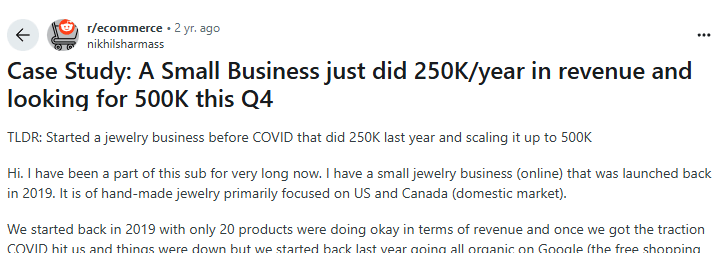
6. Build relationships with influencers and industry voices
Are AI search engines citing influencer channels and publications that post inaccurate information about your brand?
In that case, you’ll want to build relationships with these industry voices. Reach out to them to clarify any misunderstandings they may have had about your brand and ask them to correct those content pieces.
You can also partner with other industry publications and influencers and ask them to write more positive and accurate content about your brand. This will lead to more valuable brand mentions that AI can cite for users.
7. Encourage happy customers to leave reviews
If AI is providing negative responses about your brand due to hostile subreddits and negative reviews on review sites, start encouraging your happy customers to leave a review. Another simple one, but it’s a great way to gain control over public narratives.
Here are a few ways to effectively persuade customers or clients to leave a review:
- Encourage them to use a QR code to leave a review while you complete the sale
- Simplify or minimize the steps within the review process
- Send direct links to the review page right after a positive experience
- Offer discounts or exclusive offers upon leaving a review
- Personalize your request for a review with their name and details about their experience
Encourage them to leave detailed and honest reviews. AI likes to cite more detailed reviews when they relate directly to a user’s query.
For example, let’s say a ChatGPT user prompts the search to provide examples of people who successfully won a court case similar to theirs. ChatGPT might then cite a review from someone who reached out to a specific law firm that helped them win the same type of court case that the user is currently experiencing.
From AI crisis to AI confidence
Protecting your brand in the age of AI isn’t about fighting misinformation — it’s about leading the conversation. By following these tips and tricks, you can gain more control over public and brand narratives to win back your reputation.
If you need an extra hand in creating website content that prevents AI misinformation, our experts at WebFX can take the reins. We’ll form a content marketing strategy that helps you enhance your brand reputation and drive revenue for your business.
Browse our content marketing services or see how our AI brand visibility audit services can help you today.
-
 Thaakirah Abrahams is a Marketing Editor at WebFX, where she leverages her years of experience to craft compelling website content. With a background in Journalism and Media studies and certifications in inbound marketing, she holds a keen eye for detail and a talent for breaking down complex topics for numerous sectors, including the legal and finance industries. When she’s not writing or optimizing content, Thaakirah enjoys the simple pleasures of reading in her garden and spending quality time with her family during game nights.
Thaakirah Abrahams is a Marketing Editor at WebFX, where she leverages her years of experience to craft compelling website content. With a background in Journalism and Media studies and certifications in inbound marketing, she holds a keen eye for detail and a talent for breaking down complex topics for numerous sectors, including the legal and finance industries. When she’s not writing or optimizing content, Thaakirah enjoys the simple pleasures of reading in her garden and spending quality time with her family during game nights. -

WebFX is a full-service marketing agency with 1,100+ client reviews and a 4.9-star rating on Clutch! Find out how our expert team and revenue-accelerating tech can drive results for you! Learn more
Try our free Marketing Calculator
Craft a tailored online marketing strategy! Utilize our free Internet marketing calculator for a custom plan based on your location, reach, timeframe, and budget.
Plan Your Marketing Budget

See AI Marketing in Action
Explore how WebFX helped a regional brand get discovered in AI search experiences — proving what’s possible with today’s AI-driven marketing!

Proven Marketing Strategies
Try our free Marketing Calculator
Craft a tailored online marketing strategy! Utilize our free Internet marketing calculator for a custom plan based on your location, reach, timeframe, and budget.
Plan Your Marketing Budget
What to read next




